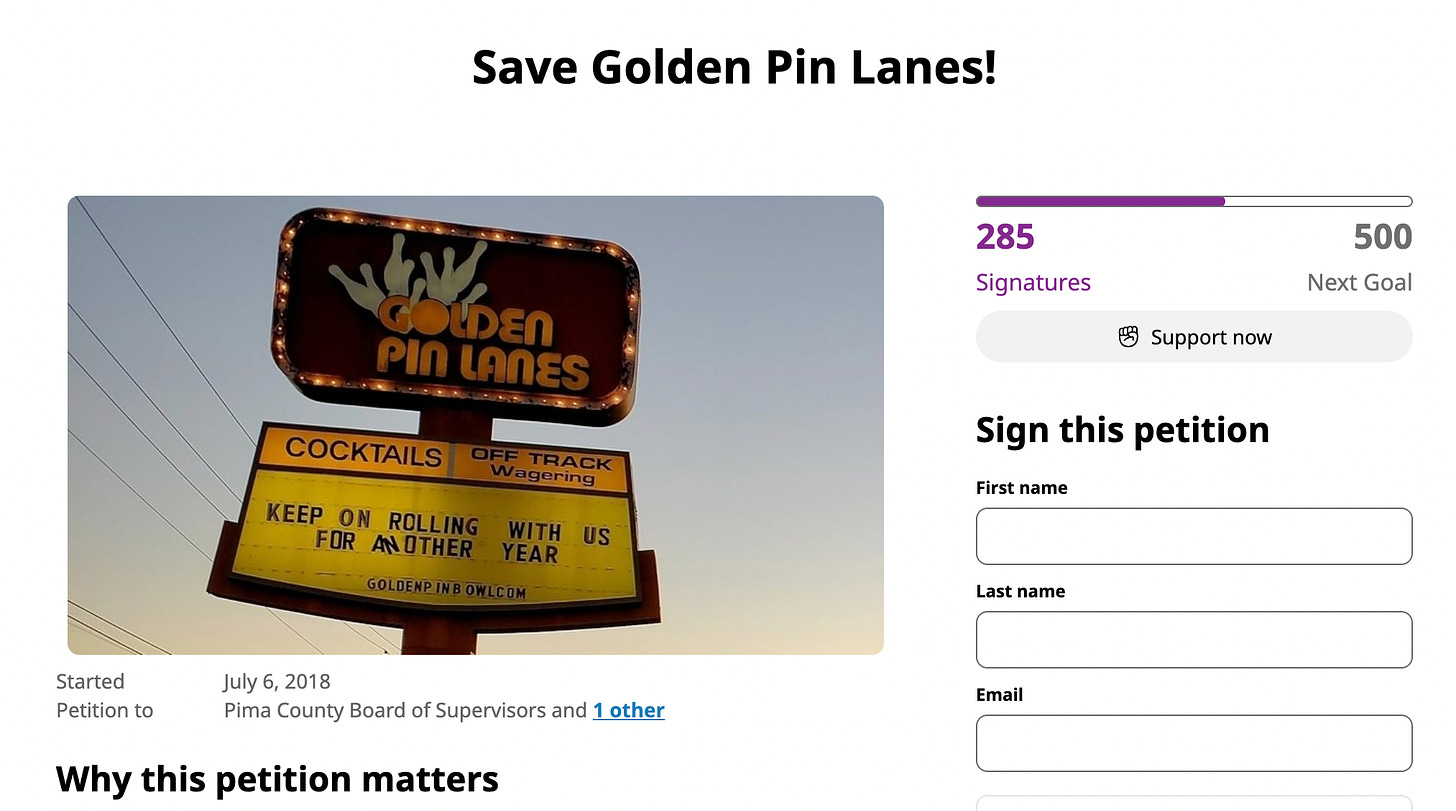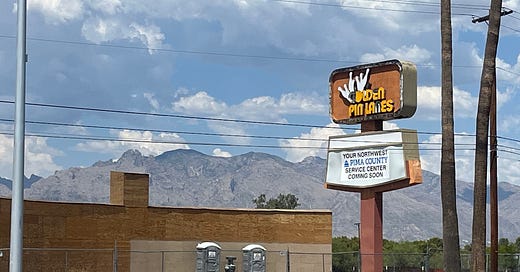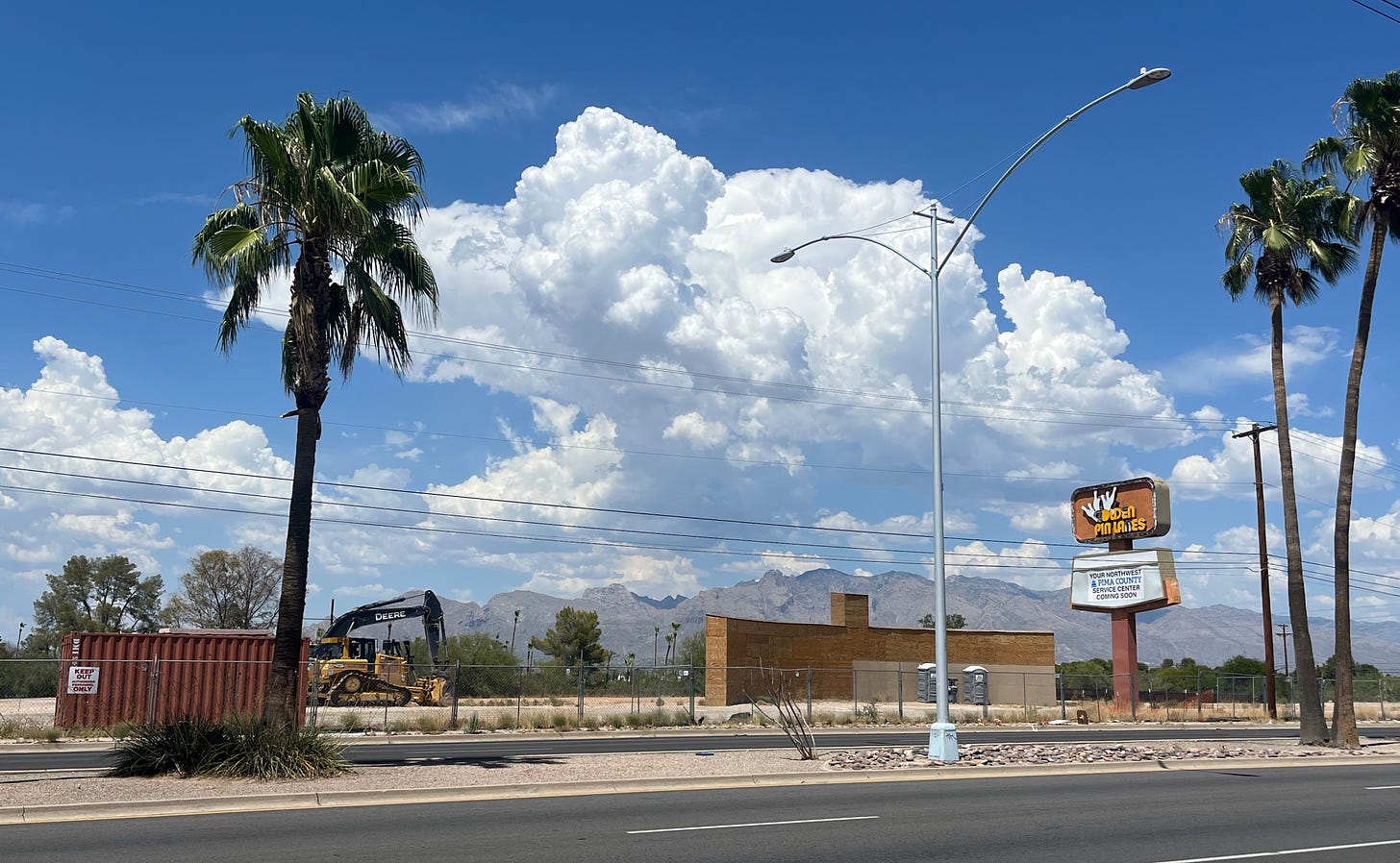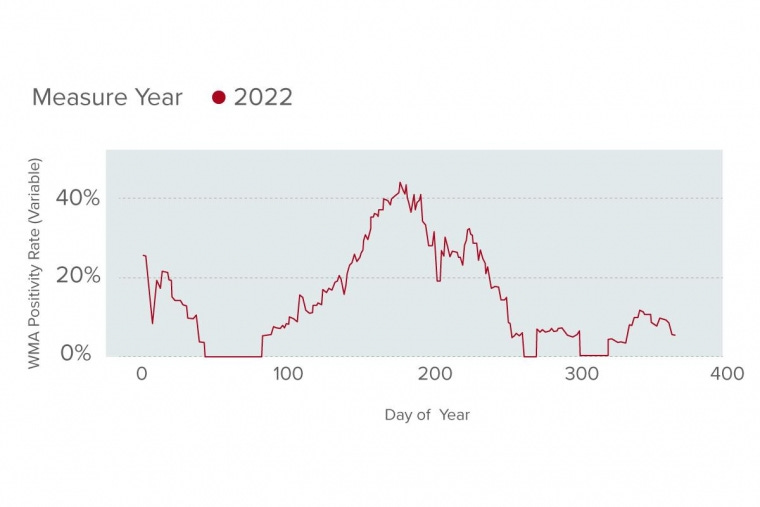The Daily Agenda: What's your definition of "soon?"
Northwest Service Center project update ... Meanwhile, on the south side ... Valley fever season has arrived
It’s hard to drive down Miracle Mile without noticing the empty lot that used to be occupied by Golden Pin Lanes, its brown and gold sign still mostly intact, but with one small change.
Underneath it hangs a banner advertising “Your Northwest Pima County Service Center Coming Soon.”
But that service center has been “coming soon” for years, so we poked around to see what’s going on and if it’s on schedule.
The short answer is kind of, but first, a little history. The Pima County Supervisors voted to purchase the property for $2.85 million in May 2018, with the plan of turning the bowling alley into county offices.
The building on West Miracle Mile near North Fairview Avenue was set to become the health department’s north clinic, adult probation’s westside office, juvenile court’s northwest office and several other offices, as the Arizona Daily Star’s Murphy Woodhouse reported at the time.
The idea was that buying the building would allow the county to stop leasing office space from various sites, while also creating a centrally located, one-stop service center.
Renovations — expected to start in the summer of 2019 — were estimated to cost about $4 million. Neighbors and longtime bowlers decried the sale, starting a petition and fundraising page to lease the facility from the county.
But on Friday, June 21, bowlers played their last game.
In early 2020, the county had begun “architectural programming” for the facility and planned to begin detailed planning “and even construction in late 2021,” then Pima County Administrator Chuck Huckelberry wrote in a memo.
But we all know what happened next, and the pandemic led to delays and the project’s eventual change in course. Now, five years after its purchase, construction is finally poised to begin.
But it wont be for the plan as originally envisioned, and it’ll cost a whole lot more than the $4 million in renovations the county originally projected.
Instead of breaking ground at the end of 2021 as planned, the county went back to the drawing board. Armed with newly-available American Rescue Plan Act funds, they decided to expand the project and focus largely on public health.
That new vision, coupled with the realization that simply renovating the building wasn’t going to work out, led to another change in plans: The county decided to demolish the old building and rebuild.
“We did a full examination with architects and designers and determined that the building wasn’t going to work,” county spokesman Mark Evans explained. “It was constructed to be a bowling alley. In part of it, the roof or ceiling was too low to meet various requirements.”
In December 2021, supervisors approved $34.9 million in American Rescue Plan Act funds to be used for the new Northwest Service Center 2.0.

The county’s project and facilities offices decided on a two-story, 38,000 square foot building that would include a public health clinic providing vaccines, sexually transmitted infection testing and treatment and contraceptive services.
It will also include mobile food truck inspection areas, vital records services and adult and veteran employment services, housing and education. It’s not the original plan, but it’s still a good plan, Evans said.
“All of the reasons for why we acquired the building still exist,” Evans said. “We have lots of services and storefronts we’re paying rent on that still have various issues with parking and accessibility. At the end of the day, the taxpayers will save money on consolidation.”
The county expects the Northwest Service Center 2.0 to open by December 2024. Last month, County Administrator Jan Lesher said the project is still on schedule, with the final design completed in June and construction expected to start soon.
Caitlin stopped by the site last week, and while there were no workers present (it was later in the day), heavy equipment was on the ready and the area showed signs of life.
That’s good, because, this time, the schedule really matters. The city is facing a deadline or it will lose that $34.9 million in ARPA funding. The U.S. Department of Treasury says the money must be spent by December 31, 2026.
And we know it can be done! As a point of comparison, let’s talk about the south side’s Tucson Marketplace and what’s happened there in the years since the county purchased Golden Pins.
In 2018, the center held little more than a Walmart, Costco, Dave and Buster’s, movie theater and a handful of restaurants and shops. Today, it’s an actual marketplace, with the addition of three hotels, a Circle K, Geico’s regional office, JTED's Innovative Learning Center, nearly a dozen new restaurants and more construction in the works.
That’s a lot of growth in a short amount of time, which shows how fast things can move when there’s real money on the line.
Think of the newsroom we could build with $35 million! But we only need about $100,000 to stay afloat for the first year. Help us hit that goal!
Beefing up security: The Tucson Metro Chamber and the city’s Ward 4 office have awarded $100,000 in American Rescue Plan Act funds to support 11 local businesses’ security upgrades, councilwoman Nikki Lee writes in her newsletter. The grants range from $5,000 to $10,000 and will pay for improved lighting, technology enhancements, property cleanup, training and signage. Recipients include Ironwood Financial, MagMod, RNR Tire Express, Mama Louisa's Italian Restaurant and Catering, TMM Family Services, Lieder Digital, The Maverick, Tucson Symphony Orchestra, FORS Architecture + Interiors, Copper Spoke Cycles, and Sonoran Stitch Factory.
Fever pitch: A University of Arizona forecasting tool that uses urgent care data to determine when Valley fever is spiking in the community has shown that the state is officially in Valley fever season, UA News writes. The tool was developed by a team in Tucson at the UA’s Valley Fever Center for Excellence. In response, the center has been working with Banner Health to increase testing in its 44 clinics across the state.
"Right now, if you're diagnosed with pneumonia, there is about a 1-in-5 chance that your pneumonia is caused by Valley fever," center director Dr. John Galgiani said. "If you live in Arizona and you get pneumonia, you should be tested for Valley fever."
Bring on the bucks: Nearly every Pima County employee will receive a raise as a result of a year-long study that found the county inadequately classifies and pays its workers, according to the Arizona Daily Star’s Nicole Ludden. Supervisors voted unanimously last Tuesday to spend $9.5 million to reorganize employees into new salary grades and job classifications. The outside firm, which the city paid about $380,000 to conduct the study, found that about one-third of county employees earn less than those in similar positions throughout the state.
Task force nets results: Marana Unified School District has seen a growth in literacy since implementing an Early Literacy Task Force and providing training to teachers and administrators using pandemic relief funds, Tucson Local Media’s Veronica Kuffel reports. More than 1,200 teachers participated in the program and in K-6 classrooms, teachers have increased their reading and writing curriculums from 90 to 135 to 155 minutes a day.
“On the literacy benchmarks we implement at MUSD, we’ve seen growth at every grade level and in every cohort since 2021,” assistant superintendent Kristin Reidy said.
Hearing on hold: An August 15 public hearing about a proposed hot-mix asphalt plant near Quail Creek has been canceled, according to the Green Valley News. The hearing on Vulcan Materials’ plant was originally scheduled during a Sahuarita Planning and Zoning Commission meeting, but the town said it’s going over the application and safety concerns raised by the public, including traffic, odors, health and environmental impacts and has hired a consultant to help analyze the application’s technical aspects. A new hearing will likely be held in mid-September.
Expanding its reach: The University of Arizona received a $1.1 million grant from the Substance Use and Mental Health Services Administration to help expand a local treatment program, according to UA News. The UA’s Southwest Institute for Research on Women will help expand the Native Ways Program offered by The Haven, a Tucson treatment center for women. The program helps Native American women with substance use recovery, while incorporating Native American culture and traditions. The grant began in September and has allowed The Haven to add an additional 135 clients to the program by funding the hiring of a program manager and additional therapists, and boosting its outreach to all of Arizona's 22 federally recognized tribes.
$8 million: The amount spent to date for work on the Northwest Service Center. The project construction budget is $39 million, up from the $4 million originally planned.











